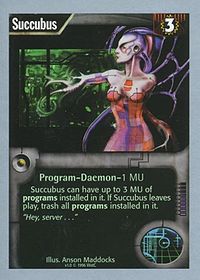On November 6th, 2024, the 9,000th article was added to the SuccuWiki!
Succubus (Netrunner)
For other uses of the word Succubus, see Succubus (disambiguation).
Netrunner is a collectible card game designed by Richard Garfield, the creator of Magic: The Gathering. It was published by Wizards of the Coast and introduced in 1996. The game is based heavily on the Cyberpunk 2020 role-playing game published by R. Talsorian Games, but also draws additional flavor from the broader cyberpunk genre. Netrunner was lauded by critics, such as InQuest magazine, for its balanced game play and impressive artwork. In 1999 Pyramid magazine named Netrunner as one of The Millennium's Most Underrated Games. According to editor Scott Haring, "among the connoisseurs of the card game design art, Netrunner is considered to be one of the best-designed games ever."[1]
In this game, there is a program daemon called a Succubus.
Game Details
- Name: Netrunner
- Designer: Richard Garfield
- Publisher: Wizards of the Coast
- Players: 2 to 6
- Age range: 9+
- Setup time: < 3 minutes
- Playing time: ~ 45 minutes
- Random chance: Some
- Skills required: Card playing, Arithmetic
Gameplay
Netrunner depicts cyberspace combat between a global mega-corporation (the Corp) and a hacker (the Runner). The Corp's goal is to complete their secret agendas before the Runner can hack in and spoil their secret plans for world domination. It isn't easy, though, as the Corp has strong defensive data forts protected by malevolent computer programs known as ICE (short for Intrusion Countermeasures Electronics). The Runner must use special programs of their own (called Icebreakers) to break through and steal the hidden plans - to keep the Corp from taking over completely. All this is paid for in the game by a system of resources called bits (representing currency), which are earned and spent during the course of play. An interesting feature of Netrunner is that each side has different abilities and uses completely different cards distinguished by alternate card backs. This contrasts with most other Collectible card games, which usually depict a "battle between peers" where each opponent draws upon the same card pool. While a player does not have to play both sides except in tournament play, it is commonly held that a firm understanding of both leads to better overall player ability.
Expansion sets
- Netrunner base set (aka Limited, v1.0) - 374 cards - Release Date: April 26, 1996
- Netrunner Proteus (v2.1) - 154 cards - Release Date: September 1996
- Netrunner Silent Impact - Never released, development halted by WotC. However, a series of six cards labelled 'v2.0' were issued as promotional cards for a planned, but never released, Netrunner 2.0 core set. Even though originally appearing in Netrunner 1.0, these six cards have been revised for 2.0 and feature new artwork as well as revised game text. The six cards in question are Forged Activation Orders, misc.for-sale, The Shell Traders, Pacifica Regional AI, Bizarre Encryption Scheme, and New Galveston City Grid. Extremely rare and very hard to find.
- Netrunner Classic (v2.2) - 52 cards from the Silent Impact set- Release Date: November 1999
- The Cyberpunk 2020 supplement Rache Bartmoss' Brainware Blowout featured rules on using Netrunner cards instead of the rpg's existing system to simulate netrunning during game sessions. It also gave conversions to the rpg of some of the cards in the base set (the rest having been mentioned in one book or another).
Webrunner
Netrunner launched with a proto-alternate reality game called Webrunner: The Hidden Agenda, which cast players as hackers against the evil Futukora corporation. Players broke through seven puzzle-themed "gates" to get the secret data ("agenda"). The popular game was the first online game tied in to a product release, making the front page of the New York Times technology section.
A sequel, Webrunner II: The Forbidden Code, followed on release of the Proteus expansion. In this, players were cast as security chiefs beset by hackers.
Online gameplay
NetRunner was playable online through CCG Workshop in the past, but it was shut down by Wizards of the Coast. It is now possible to play NetRunner online using Magic Workstation on Runners' Net, a site which also holds IRC chats and forums to discuss the game. Players may also use other CCG engines such as LackeyCCG or Gccg, which allows players to build and share plugins for different card games and play the games online.
Product ownership
Zvi Mowshowitz, a well-known Magic: The Gathering Pro Tour player, attempted to purchase the license for Netrunner from Wizards of the Coast after the company stopped producing the game. Negotiations, however, fell apart without any revival of the game or transfer of ownership.
The Succubus Daemon Card
Card Data
- Card Name: Succubus
- Set: Netrunner Limited
- Number: 69 / 374
- Rarity: Rare
- Player: Runner
- Card Type: Program-Daemon-1 MU
- Installation Cost: 3
- Memory: 1 MU
- Rules Text: Succubus can have up to 3 MU of programs installed in it. If Succubus leaves play, trash all programs installed in it.
- Flavor Text: "Hey, server ..."
- Illustration: Anson Maddocks
- Copyright: v1.0 © 1996 WotC
References
- ↑ Haring, Scott D. (1999-11-25). "Second Sight: The Millennium's Most Influential Company and The Millennium's Most Underrated Game". Pyramid (online).
External links
- The original source of this page at Wikipedia
- Netrunner Online - Netrunner Resource for Collectors, Traders and Gamers.
- Top Runners' Conference - The Official Netrunner Player Organization
- The Netrunner Weekly - Online magazine
- The Short Circuit
- Runners' Net - Play NetRunner online with MWS and discuss about the game.
- Runners' Net Forums - Discussion forum for Netrunner and online play.
- Netrunner at BoardGameGeek
